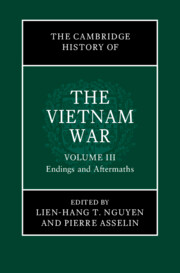Book contents
- The Cambridge History of the Vietnam War
- The Cambridge History of the Vietnam War
- The Cambridge History of the Vietnam War
- Copyright page
- Contents
- Figures
- Maps
- Contributors to Volume III
- General Introduction
- Introduction
- Part I The Late Vietnam War
- 1 Nixon’s War
- 2 US Military Strategy in the Nixon Era
- 3 The US Congress and the Vietnam War
- 4 US Antiwar Sentiment and International Relationships in the Late Vietnam War
- 5 Saigon War Politics, 1968–1975
- 6 Hanoi’s Politburo at War, 1969–1975
- 7 The Vietnam War and the Regional Context
- 8 Moscow, Beijing, and Détente
- 9 The Easter Offensive and the Second Air War
- 10 The Second Civil War, 1973–1975
- 11 Cambodia at War
- 12 Laos at War
- Part II The Postwar Era
- Part III Legacies
- Index
1 - Nixon’s War
from Part I - The Late Vietnam War
Published online by Cambridge University Press: 02 January 2025
- The Cambridge History of the Vietnam War
- The Cambridge History of the Vietnam War
- The Cambridge History of the Vietnam War
- Copyright page
- Contents
- Figures
- Maps
- Contributors to Volume III
- General Introduction
- Introduction
- Part I The Late Vietnam War
- 1 Nixon’s War
- 2 US Military Strategy in the Nixon Era
- 3 The US Congress and the Vietnam War
- 4 US Antiwar Sentiment and International Relationships in the Late Vietnam War
- 5 Saigon War Politics, 1968–1975
- 6 Hanoi’s Politburo at War, 1969–1975
- 7 The Vietnam War and the Regional Context
- 8 Moscow, Beijing, and Détente
- 9 The Easter Offensive and the Second Air War
- 10 The Second Civil War, 1973–1975
- 11 Cambodia at War
- 12 Laos at War
- Part II The Postwar Era
- Part III Legacies
- Index
Summary
A consideration of the four-year period that began with Richard Nixon’s ascension to the presidency of the United States in January 1969 and ended with signing of the Paris Peace Accords in 1973 raises several important questions about the Vietnam War. Could an agreement comparable to the 1973 deal have been secured earlier? If so, who bears responsibility for the delay? What was the impact of the antiwar movement on Nixon’s Vietnam policy? Was the war’s expansion into Laos and Cambodia necessary or criminal? Were the constraints on Nixon’s prosecution of the war evidence of the functioning of democracy or of the weakness of the American system, which jeopardized and discredited US foreign policy? Did international opposition to the war hinder Nixons efforts to achieve “peace with honor” and make full use of the US military to support his diplomatic initiatives? Or, on the contrary, did it prevent escalation and even greater bloodshed by denouncing the “immorality” of the conflict? In short, under what circumstances did the January 1973 peace agreement come about? Three major milestones marked Nixon’s relationship with Vietnam, the rest of Indochina, and Southeast Asia generally between 1969 and 1973. Although Nixon did not have a secret plan to end the war in Vietnam when he took office, he gradually put a strategy in place. In this respect, 1969 was a year of trial and error, of failure and deadlock. Certainly, important processes were underway, such as Vietnamization and secret negotiations, though the latter were, at the time, largely unproductive. Subsequently, Vietnamese communist policymakers would claim that in initiating the phased withdrawal of their forces in 1969, the Americans in fact weakened their bargaining position. Thus, by the turn of the new decade, the United States remained unable to achieve “peace with honor.” To overcome these aporias, Nixon, assisted by National Security Advisor Henry Kissinger, tried to move from the local to the global, transposing and adapting his strategy in the broader context of the opening up of China and détente with the Soviet Union, two initiatives that, in Kissingers words, restored Southeast Asia to its true scale: that of a “small peninsula at the end of a huge continent.” But this so-called triangular diplomacy still failed to end the war. Therefore, Nixon redoubled the military pressure on Hanoi in 1972 until reaching a peace agreement that failed to deliver the peace it promised. To what extent was all this a cowardly “decent interval” snatched by the United States, before the inevitable collapse of Saigon, Phnom Penh, and Vientiane? Or was it proof of a real and credible will to maintain the political status quo in the region?
- Type
- Chapter
- Information
- The Cambridge History of the Vietnam War , pp. 23 - 44Publisher: Cambridge University PressPrint publication year: 2024

